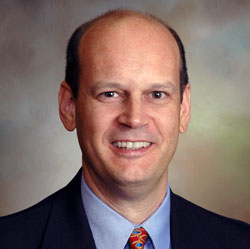Commissioner seeks greater visibility for 11-member league
By Kevin Gray
 While Atlantic Sun Conference Commissioner Ted Gumbart ’84 might not have displayed the most memorable prowess on the College’s athletic fields, he does recall his participation with great humor.
While Atlantic Sun Conference Commissioner Ted Gumbart ’84 might not have displayed the most memorable prowess on the College’s athletic fields, he does recall his participation with great humor.
“I played one year of soccer and, fighting injuries, mind you, worked my way to the end of the bench on the JV squad,”? he says. “We had a blast. I enjoyed club sports and intramurals after that. With the Rugby Club, I think I still hold some sort of record — one for shortest career. I played my first game with the B squad at Princeton and put a great hit on their biggest ball carrier to take him down. My shoulder dislocated and I walked off the field to conclude my career. I did, however, score on a free kick before leaving the game, so my field goal percentage is 100 percent. I think that record will stand.”
Gumbart put his athletic career to rest, but became involved in the administrative side of sports. He joined the Atlantic Sun Conference staff as its first assistant commissioner in 1991. A promotion to associate commissioner in 1997 was followed by another to senior associate commissioner in 2004. In January 2007, Gumbart became the fourth full-time commissioner of the Atlantic Sun Conference.
Based in Macon, Ga., the conference was founded in 1978 as the Trans America Athletic Conference, changing to its current name in June 2001. It combines 11 of the southeast’s private and state schools.
“We recognize the value of the Division I competitive experience, but the first part of “student-athlete” is first for a reason,”? Gumbart says. “We take great pride in the fact that more than 53 percent of our student-athletes achieve All-Academic status.”
He is responsible for oversight of the conference’s basic services, such as scheduling, officiating, maintaining the web site, and conducting championships; and then there are the marketing and promotions items, such as the conference’s Friday Night Game of the Week TV package, its weekly magazine show, and generating support through its corporate partner program. One of the most important challenges is boosting the A-Sun identity on a more national scale.
“In 2006, we had our first indoor track and field championship, and when I handed out the final award, the championship trophy, the winning team took a victory lap with its championship banner and trophy,” he recalls.”A lot of work went into making that moment possible, and knowing that our office had a role in supporting it, that is gratifying.”
An economics and business graduate, Gumbart earned an M.B.A. from Stetson University in 1987. He maintains ties to Lafayette through the friendships established while attending school, and he keeps up with the school’s Division I athletic teams through the web site and Maroon Club newsletters.
He says the first thing that comes to mind about his Lafayette experience is the feeling of close, caring relationships within the small campus community, not only with his fellow students, but with the faculty as well.
“I knew my professors, and they knew me,” he says. “You would recognize most of the people you would pass on campus in any given day, and you felt a part of it. I still love the feel of campus, and that it is mostly a walking setting; that fits.”
Gumbart appreciated that the small class sizes at Lafayette allowed the students to connect with their professors. There were many professors who had a positive impact on him, such as James Hvidding in Macroeconomics, who was writing a book and testing the chapters on Gumbart’s class, and Robert Higgs, who taught Economic History of the U.S., which was one of his favorite classes.
“The story that probably gives the best representation of what Lafayette meant to me is one involving my English professor, June Schlueter,”? he says. “I had a ‘see me’ note on one of my papers. We set up a meeting at her house ?and I walked over to review my paper while we sat on her porch. She taught me some important fundamentals of creating better writing. The lessons stuck, and the memory did, too.”
Gumbart also enjoyed the opportunity to participate in many different activities. In addition to his year in soccer and participation in club and intramural sports, he wrote for the newspaper, worked on the radio station, was active with his fraternity, spent a semester in Paris through the study abroad program, and served as a tutor.
“Lafayette is big enough to have a great range of opportunities, but small enough so that I could actually take advantage of so many of them,”? he says. “I think my Lafayette experience prepared me for, and also confirmed my abilities and interests in, the job I have now. I’m involved with many different things — ?TV packages, running championships, managing officiating programs, working with our Student-Athlete Advisory Committee — and doing it in a setting that values the personal relationships.”
 While Atlantic Sun Conference Commissioner Ted Gumbart ’84 might not have displayed the most memorable prowess on the College’s athletic fields, he does recall his participation with great humor.
While Atlantic Sun Conference Commissioner Ted Gumbart ’84 might not have displayed the most memorable prowess on the College’s athletic fields, he does recall his participation with great humor.